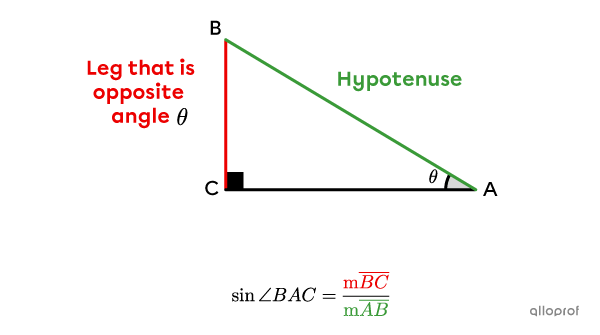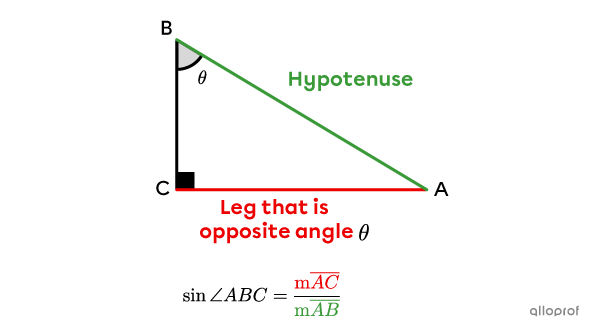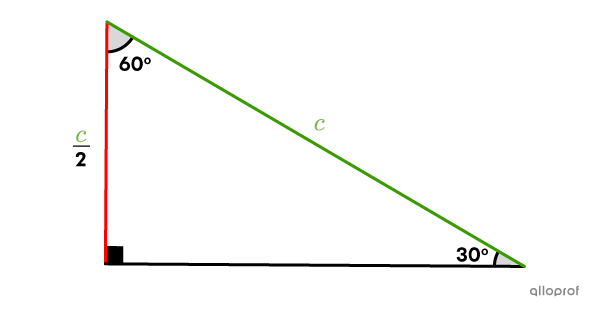The Trigonometric Ratio of Sine
The sine ratio is one of the 3 main trigonometric ratios found in a right triangle.
In a right triangle, the sine of an angle |(\boldsymbol \theta)| is the ratio between the length of the leg that is opposite the angle and the hypotenuse.||\sin \theta=\dfrac{\text{leg $\color{#EC0000}{\text{opposite}}$ angle }\theta}{\text{$\color{#3A9A38}{\text{hypotenuse}}$}}||
If we want to find the sine of the acute angles in the following right triangle, we get 2 ratios.


Be careful!
The sine trigonometric ratio is only used with respect to the acute angles of a right triangle. The sine is never sought in relation to the right angle.
Finding the length of a side using the |\boldsymbol\sin| trigonometric ratio sin trigonometric ratio
Finding the length of a leg using the |\boldsymbol\sin| ratio sin ratio
To find the length of a leg of a right triangle using the sine ratio, the length of the hypotenuse and the measure of the angle opposite the side in question must be known.
Find the length of side |\overline{BC}| using the sine ratio in the following right triangle.

See solution
Tip
For greater accuracy, do the calculations in one step on a calculator. If this is not possible, keep at least 3 to 4 digits after the decimal point to ensure greater accuracy.
Here is an example when |\theta=65^{\circ}| and the hypotenuse measures |59\ \text{cm}.|
Performing the calculation in one step
|\begin{align}\sin65^{\circ}&=\dfrac{a}{{59}}\\\sin65^{\circ}\times59&=a\\\color{#EC0000}{53.47}&\approx a\end{align}|
Performing the calculation in 2 steps
|\begin{align}\sin65^{\circ}&=\dfrac{a}{59}\\\color{#ec0000}{0.91}&\approx\dfrac{a}{59}\\0.91\times59&\approx a\\\color{#EC0000}{53.69}&\approx a\end{align}|
If the calculations are performed in 2 steps, and we only round to 2 decimal places when calculating the sine of the angle, there will be a difference of 22 hundredths compared to the correct answer.
In some cases, neither the length of the hypotenuse nor the length of the side opposite the angle are known. In order to apply the sine ratio, the measure of the other angle has to be determined.
Use the sine ratio to determine the length of the leg sought in the following right triangle.

See solution
In the last example, the cosine trigonometric ratio could have been used to find the length of the leg sought using the |69^{\circ}| angle. The answer would be the same.
Finding the length of the hypotenuse using the |\boldsymbol\sin| ratio sin ratio
To find the length of the hypotenuse in a right triangle using the sine ratio, the measure of one acute angle and the side opposite it must be known.
Find the length of the hypotenuse using the sine ratio in the following right triangle.

See solution
Tip
The sine ratio with a |\boldsymbol{30^{\circ}}| angle30∘ angle
In a right triangle, the length of the leg opposite a |30^{\circ}| angle is always equal to half the length of the hypotenuse.
This means the sine ratio is always |\dfrac{1}{2}.|||\begin{align}\sin30^{\circ}&=\dfrac{\text{leg $\color{#EC0000}{\text{opposite}}$ angle }\theta}{\text{$\color{#3A9A38}{\text{hypotenuse}}$}}\\&=\dfrac{\frac{\color{#3A9A38}c}{2}}{\color{#3A9A38}c}\\&=\dfrac{1}{2}\end{align}||

What is the length of side |\overline{AB}| in the following triangle?

See solution
Finding an angle measure using |\boldsymbol{\sin^{-1}}|sin−1
To find the measure of an acute angle in a right triangle using the sine ratio, the length of the side opposite it and the length of the hypotenuse must be known. This is essentially the same as answering the following question: “What angle gives a sine of...?”
First, determine the sine ratio, then use the |\sin^{-1}| key (also called |arcsin| ) on a calculator.
Find the measure of angle |BAC| in the following right triangle using the sine ratio.

See solution
In trigonometry, there are several possible ways to get the same answer. In the previous example, we could have used |\boldsymbol{\tan^{-1}}| with respect to angle |BAC,| which would have given the measurement directly.
Find out more!
The arcsine function (denoted |\sin^{-1}(x)| ) is the inverse of the sine function.||\sin \theta=x\ \Leftrightarrow \ \sin^{-1}x=\theta||
- Top of page
- Finding the length of a side using the |\boldsymbol\sin| trigonometric ratio sin trigonometric ratio
- Finding the length of a leg using the |\boldsymbol\sin| ratio sin ratio
- Finding the length of the hypotenuse using the |\boldsymbol\sin| ratio sin ratio
- Tip
- Finding an angle measure using |\boldsymbol{\sin^{-1}}| sin−1
- See Also
